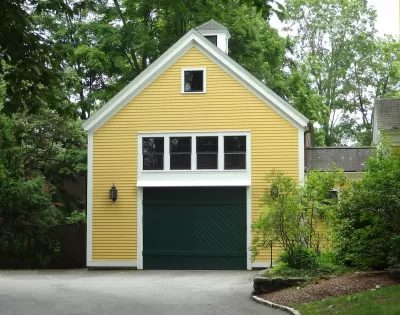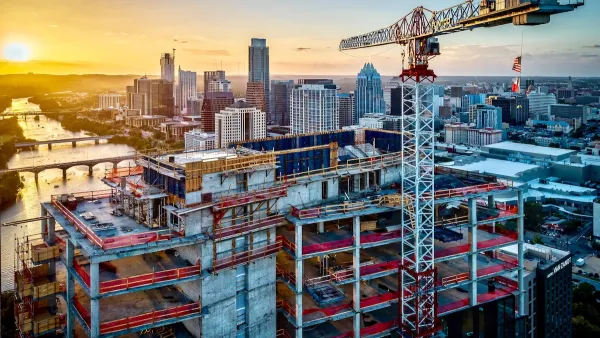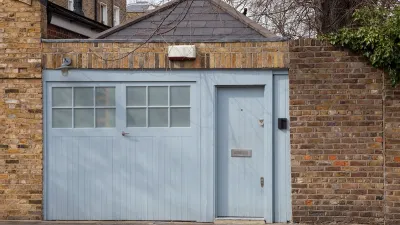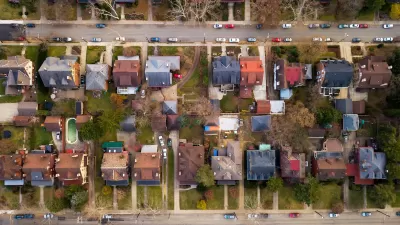One writer argues that backyard homes can hinder community-building and relegate some residents to the shadows.

In an op-ed in Next City, Travis Beck warns against the pitfalls of accessory dwelling units (ADUs), an increasingly popular way for cities to make way for ‘gentle’ density increases and more housing units.
Beck, who lived in a neighborhood rife with ADUs in Santa Cruz, California, argues that “Implemented at scale, … ADUs are a bad urban design solution. They disrupt the neighborhoods they are intended to preserve and can limit, rather than create, social opportunity.”
While ADUs can be relatively inexpensive and fast to build and can provide new housing in existing neighborhoods, Beck argues that “tucking more people into the backyards and former garages of a single-family neighborhood preserves the dream of homeownership for only a segment of the population, cuts off access to neighborhood life for the rest — and puts everyone in an uncomfortable arrangement.” For Beck, the nature of ADUs created “two parallel neighborhoods,” relegating some residents to the backyards of other homes without street-facing yards or porches, creating “limited opportunities for neighborly relationship building.” Beck does not address the possibility that the backyard tenants are elderly family members who may require care from adult children or young adult children who may not be able to otherwise afford housing in the same city or neighborhood.
Beck argues that “There are better ways to add density while building opportunity and the community life of neighborhoods,” recommending instead zoning changes that encourage other mid-density housing such as fourplexes or townhomes. For Beck, street-facing frontage seems to be the key to creating community, but how many residents of single-family neighborhoods don’t actually ever interact with their neighbors, regardless of the size of their porches or their closeness to the street? It should be noted that ADUs don't always mean backyard cottages. In some cases, ADUs are converted basements or garages located on the same plane, or even in front of, the ‘main’ house.
For Beck, good urban design means permitting multifamily housing and building more in denser, walkable parts of town. “Rather than pursue the seemingly easy option of permitting more ADUs, they should use the familiar built forms of denser neighborhoods to create housing and community for more of the population at the same time.”
FULL STORY: ADUs Can Help Address The Lack Of Housing. But They’re Bad Urban Design.

Maui's Vacation Rental Debate Turns Ugly
Verbal attacks, misinformation campaigns and fistfights plague a high-stakes debate to convert thousands of vacation rentals into long-term housing.

Planetizen Federal Action Tracker
A weekly monitor of how Trump’s orders and actions are impacting planners and planning in America.

Chicago’s Ghost Rails
Just beneath the surface of the modern city lie the remnants of its expansive early 20th-century streetcar system.

Bend, Oregon Zoning Reforms Prioritize Small-Scale Housing
The city altered its zoning code to allow multi-family housing and eliminated parking mandates citywide.

Amtrak Cutting Jobs, Funding to High-Speed Rail
The agency plans to cut 10 percent of its workforce and has confirmed it will not fund new high-speed rail projects.

LA Denies Basic Services to Unhoused Residents
The city has repeatedly failed to respond to requests for trash pickup at encampment sites, and eliminated a program that provided mobile showers and toilets.
Urban Design for Planners 1: Software Tools
This six-course series explores essential urban design concepts using open source software and equips planners with the tools they need to participate fully in the urban design process.
Planning for Universal Design
Learn the tools for implementing Universal Design in planning regulations.
planning NEXT
Appalachian Highlands Housing Partners
Mpact (founded as Rail~Volution)
City of Camden Redevelopment Agency
City of Astoria
City of Portland
City of Laramie





























